These are the 4 basics of optimal nutrition, that you can implement into your day to day routine. That’s gonna help you reach your goal, improve your heath and boost your performance.
- EATING SCHEDULE
- KEY NUTRIENTS
- FOOD SELECTION
- HYDRATIONS
EATING SCHEDULE
So there’s a few different routines, that people typically follow as part of their eating schedule.
EATING EVERY TWO TO THREE HOURS
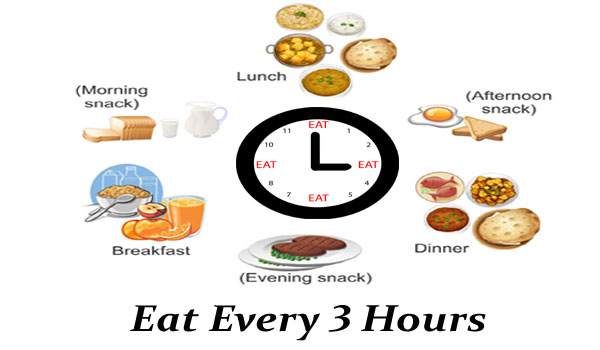
- First one is considered kind of the most common, which is eating every two to three hours. So a typical day for somebody like this would be – breakfast in the morning they follow that up with a mid-morning snack, then they’re having lunch another snack and finishing off their day with dinner. That’s a very common practice for most people and it’s a very healthy routine.
THE THREE SQUARE MEALS

- But there’s other people, who might follow the three square meals on routine. Where they really thrive off just eating breakfast, lunch and dinner. They’re not really big snacks eaters and that’s perfectly fine as well.
INTENTIONAL FASTING
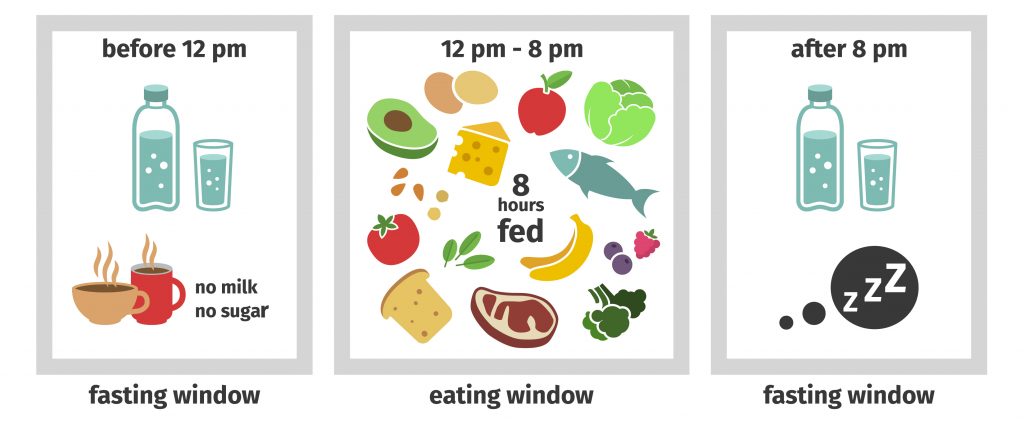
- And then lastly, there’s people who skip meals or they put themselves into a state of intentional fasting. So what that looks like is perhaps on purpose. They’re skipping breakfast every morning and then the first meal is lunch. Then they’re having snack, dinner and that’s a perfectly healthy routine as well. Fasting routine is not really recommended for those, who are pregnant, in their growth periods, having impaired glucose regulation or they want to gain muscle. It’s just not a suitable eating schedule for these types of people.
It’s all about the consistency, that you can maintain right. So whether you prefer to eat. Every couple of hours or three square meals or if you like to follow a fasting protocol. As long as you can stick with day to day. And that every day looks the same, that’s when your body is gonna thrive. Really picking that routine, that you know you can follow is where you’re gonna get the most benefit from.
KEY NUTRIENTS
Next are the key nutrients, that we want to include within these meals. This four key nutrients we want to ensure as a part of our entire day, every meal and snack.

PROTEIN
- The first one and probably the most important one is protein. Protein are the building blocks of our bodies. They’re the building blocks of muscle, bones, tissues, organs even our brains are all built using proteins. Our bodies regenerate and replace these proteins on daily basis. We want to make sure that our diet is rich in lean high-quality proteins. In order to support these tissue quality while also keeping the body healthy and strong. Every time we make a meal there always should be a source of protein whether it’s animal-based or plant-based.

CARBS
- The second key nutrient that we want to include in our daily are carbohydrates. Now, carbs have kind of developed a bad reputation over the last few years. A lot of people are associating carbs with fat gain. Unfortunately there’s not a lot of research to actually back that up. So carbs are a beneficial part of our diets. We just want to make sure we’re consuming in the right portions. What we need to know though, is that carbs are the main source of fuel for our bodies and for our brain. So we want make sure that we are including carbs as part of our meals and snacks. If you are active, carbs are your main source of energy during exercise. A lot of foods that provide carbohydrates also provide those soluble and insoluble fibers that support gut health and cardiovascular health as well. Keep in mind though that the amount that we consume can be adjusted based on the goals that we have.
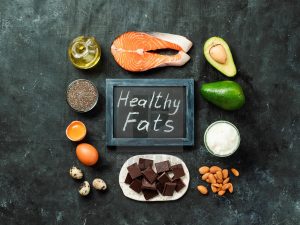
FATS
- We also want to make sure, that we are including fat in our diet as well. So again, fat had that bad reputation a few years ago as well. Everything we ate was low-fat or no fat. We actually need fat in our diets. But we need the right types of fat, the reason why, is that some healthy fats support joint health. A lot of these fats have an anti-inflammatory property to them. Those healthy fats also support cognitive function as well. So making sure that we are keeping our brain healthy using these healthy fats. Lastly there’s a lot of essential vitamins that can only be absorbed by incorporating some of these fats in our diets. So things like vitamin A, D and K which are all vital to just the daily functioning of our bodies. We want to make sure that our body is able to absorb these. And the only way to do that is to ensure that we have enough those healthy fats in our diets.
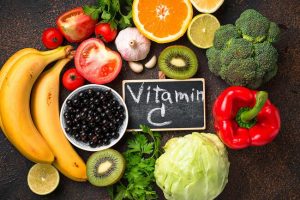
VITAMINS AND MINERALS
- Lastly we want to make sure that we are getting enough vitamins and minerals. And we’re consuming the full spectrum of vitamins and minerals with the foods that we eat. Vitamins and minerals keeps our body functioning day to day. Also keep your immune system strong and healthy and protect your body from disease. It essentially keeps you alive. So overall, when we’re building out our meals. We want to make sure that we include all four of those key nutrients throughout our meals, snacks. By the end of the day our body gets everything it needs to support health performance and just day to day functioning.
FOOD SELECTION
Now it’s time to focus on those food that are going to provide us with those key nutrient.
PROTEIN SOURCES
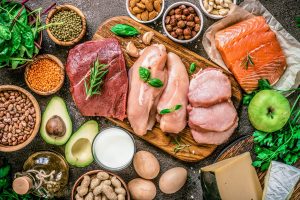
We can get protein from a number of sources. Not only lean meats things like fish, seafood, chicken and beef. We can also get it from dairy products – milk, cheese, yoghurt, those all are very good sources of protein. We have to keep in mind, that we also want to get some of those plant-based protein in our diet. So things like beans, lentils, tofu, tempeh and different nuts and seeds. Provide us with those essential proteins that our body requires.
CARBOHYDRATES SOURCES
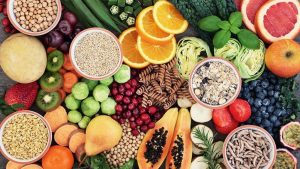
When it comes to carbohydrates there’s really two categories. The first one are grain products. So these are kind of the more nutrient-dense carb source. Things like oats, wheat bread, wheat pasta, brown rice, quinoa, couscous. Those sorts of foods provide us with a lot of complex carbs. They give us the fuel source to keep our bodies functioning throughout the day. But then we also want to make sure that we’re getting fruits and vegetables in our diet. They provide carbohydrates as well. Things like apples, different types of berries, bananas and then vegetables like sweet potatoes, carrots, pumpkin those sorts of things. Those are carbs rich nutrient-dense options that we want to include in our diets as well.
FAT SOURCES
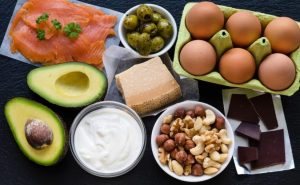
And then lastly, those healthy fats come from things like nuts, seeds and different oils. Things like almond and flax seed, chia seeds, olive oil. Even some foods like salmon which is also a protein source provides those healthy fats as well. Getting those foods as part of our diet is essential to making sure that we get healthy fats our body requires.
So we’re getting a variety of protein, carbohydrates whether it’s through grains or fruit and vegetables and if we get a variety of those fat sources that’s going to provide us with all of those vitamins and minerals. The key here is making sure we get variety throughout our diets. People typically tend to eat a lot of the same things every day, so we wanted to start really explore some of these different foods that we might not consume on a daily basis. And ultimately when you’re building out a meal getting something from each one of these categories ensure that by the end of the day you’re hitting all your key nutrient targets.
HYDRATION

Hydration and how you ensure that you are well hydrated throughout your day. The human body is approximately 72% water. So small changes in hydration can really impact the body. You may have suffered from some of these symptoms of dehydration things like: headaches, constipation, fatigue, joint and muscle pain, reduced athletic performance and impaired cognitive function. If you’ve ever had any of these symptoms you may want to take a closer look at your hydration. You might be in a dehydrated state.
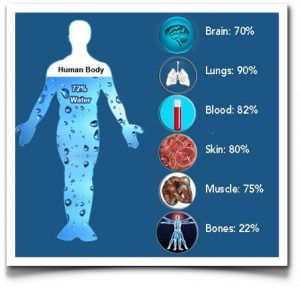
In order to avoid dehydration to stay well hydrated it’s good to know how much we actually need to drink every single day. And an easy way to figure that out is to take your weight in pounds and divide it by two. That’s the number of ounces of calorie-free fluid that you should be consuming every single day.
FLUID SOURCE
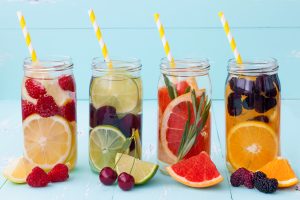
Best fluid source is water, but you can get that hydration from things like coffee and tea trying to avoid putting too much sugar or cream into those drinks, unsweetened iced tea, lemon water. So trying to hit that number on a daily basis will ensure that your body is getting all the hydration it needs to function as it’s best. One way to track hydration is to look at urine color, so we want something typically in yellow to pale yellow, that ensure that you’re in a hydrated state. The darker your urine gets the more dehydrated you are the more you’re going to need to focus on your hydration intake in the future.
